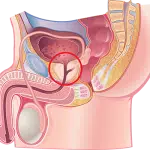“I still get nauseous the day before and have weeks of incredible anxiety” – Joaquin Phoenix, on his role as the Joker
Everyone is familiar with what anxiety feels like. It’s the physical and mental uneasiness you feel just before an exam, a date, an interview or a speech. It can manifest in different ways for different people; for some it’s a short-lived fight-or-flight response but for others it has become a part of daily life, floating in the background. What this means is that anxiety is healthy, and sometimes beneficial, but when it lingers and limits us it can be an unwanted anchor that is as damaging as any physically-impairing condition [1].
Not only can it cause psychological stress, but it can also reveal itself in physical signs [2]:
- Headache
- Nausea
- Sweating
- Increased heart rate or palpitations
- Shortness of breath
- Tremor
It’s no surprise, then, that anxiety and fear are closely related: both are emotions and a response to a real or perceived imminent threat. However, fear is generally described as a response to a short-term threat and specific to a trigger that you would rationally consider to be hostile (take the classic example of a lion chasing the nomadic hunter). On the other hand, anxiety is this reaction but stretched out – it can be a response to a vague threat in the future that may or may not happen, and the thought of escaping that threat can be as vague as the threat itself [3].
What are some causes of anxiety?
Aside from some obvious psychological causes, there are 2 you should consider:
Diet
- Coffee – A common culprit people find is caffeine – it doesn’t just keep you awake. It can also put your alertness into overdrive causing undue stress [4]
- Skipping meals, not drinking enough water or not eating fruits/vegetables – can cause your body to stress about the next meal and that dip in blood sugar or electrolytes can be the first domino in a chain of reactions
Vitamin or mineral deficiency
Vitamin B6 and Iron deficiency – this is surprisingly common. It’s especially common in pre-menopausal women, pregnant women or those who bleed more often (e.g. haemophilia). These two nutrients play an important role in regulating the production of neurotransmitters in your brain, such as serotonin, which is more commonly associated with low mood. These vitamins are also involved in the production of red blood cells so a deficiency will lead to anaemia, which can present in a very similar way to anxiety [5].
Folic acid – like some of the B vitamins, folic acid is involved in the promotion of neurotransmitter release and can lead to mood disorders and anxiety. A significant number of people have mutations in their MTHFR gene, a gene commonly screened in genetic tests for mental health, that leads to abnormal metabolism of folic acid [6]. In this subset of people, a therapeutic option is the supplementation of L-methylfolate.
SUMMARY:
Anxiety and fear are closely related in that they are both emotions and a response to a threat. However, anxiety can sometimes take over your life and there are some simple ways to fix that. One such example is through a blood test to screen for deficiencies.
For more information and advice please book a consultation with one of our GPs today: www.gogodoc.com
References:
[1] https://oxfordmedicine.com/view/10.1093/9780195173642.001.0001/med-9780195173642-chapter-10 [2] https://www.mind.org.uk/information-support/types-of-mental-health-problems/anxiety-and-panic-attacks/symptoms/ [3] https://www.psychologytoday.com/us/blog/science-choice/201812/anxiety-vs-fear [4] https://www.mind.org.uk/information-support/types-of-mental-health-problems/anxiety-and-panic-attacks/causes/ [5] https://www.mindbodygreen.com/0-11727/are-vitamins-triggering-your-anxiety.html [6] https://medlineplus.gov/genetics/gene/mthfr/


